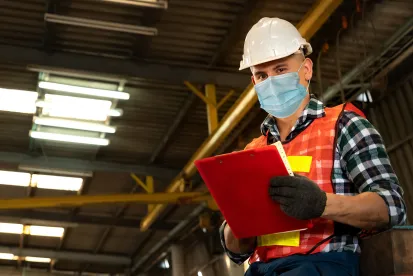The New York state legislature passed the Hero Act, which would require all employers in New York to implement certain safety standards and adopt a prevention plan to protect against further spread of COVID-19 and other airborne infectious diseases in the workplace.
The Act would require the state Department of Labor, in consultation with the state Department of Health, to create an airborne infectious disease safety standard, as well as a model airborne infectious disease exposure prevention plan. The safety standard (which ultimately will differ between industries) would establish minimum requirements on procedures and methods for the following:
-
Employee health screenings;
-
Face coverings;
-
Required PPE that must be maintained in a sanitary and reliable condition at the employer’s expense;
-
Accessible workplace hand hygiene stations and maintaining healthy hand hygiene (including providing adequate break times for employees to wash their hands);
-
Regular cleaning and disinfecting of shared equipment and frequently touched surfaces;
-
Effective social distancing for employee, consumers, and customers;
-
Compliance with mandatory or precautionary orders of isolation or quarantine that have been issued to employees;
-
Compliance with applicable engineering controls such as proper airflow, exhaust ventilation, or other special design requirements;
-
Designation of one or more supervisory employees to enforce compliance with the plan and any other federal, state, or local guidance related to avoidance of spreading an airborne infectious disease as applicable to employees and third parties (i.e., customers, contractors, and members of the public within the workplace);
-
Compliance with any applicable laws, rules, regulations, standards or guidance on notification to employees and relevant state and local agencies of potential exposure to airborne infectious disease at the worksite; and
-
Verbal review of infectious disease standards, employer policies, and employee rights.
Employers would be required to adopt the state model or implement their own written plan that meets or exceeds the standards set forth in the state model. Such plans must be provided to all employees upon the Act’s effective date (or upon reopening after a period of closure due to airborne infectious disease) and upon hire, in English and in the language identified by each employee as their primary language. If an employee identifies as their primary language a language for which a model document is not available from the state, the employer would be permitted to provide an English-language notice. Employers would also be required to post the plan in a “visible and prominent location” within the worksite and include a copy in the employee handbook. Further, employers would be required to make the plan available, upon request, to all employees, independent contractors, employee representatives, collective bargaining representatives, and the state commissioner and commissioner of public health.
The Act would prohibit discrimination and retaliation if employees (i) report violations of the Act or an employer’s plan to any state, local, or federal government entity, public officer or elected official; (ii) report airborne infectious disease exposure concerns; and/or (iii) refuse to work if the employee reasonably believes, in good faith, that such work exposes the employee or other employees or the public to an unreasonable risk of exposure to an airborne infectious disease, provided that the employee notified the employer of their concerns regarding the employer’s failure to comply with the Act and the employer failed to cure or otherwise address those concerns.
Penalties for non-compliance with the Act’s requirements may include a fine of $50 per day for failure to implement a compliant plan or between $1,000 and $10,000 for failure to abide by an adopted plan. If it is determined by the State that an employer previously violated the Act in the preceding six (6) years, such penalties may increase to $200 per day for failure to implement a compliant plan or between $1,000 and $20,000 for failure to abide by an adopted plan. Further, employees may bring a civil action against an employer and seek injunctive relief, costs, attorneys’ fees and liquidated damages. If, however, an action is brought by an employee and a court finds that such action is “completely without merit in law and undertaken primarily to harass or maliciously injure another,” the employer may seek sanctions against the party who brought such action.
In addition, the bill would require employers with at least 10 employees to allow employees to “establish and administer a joint labor-management workplace safety committee.” Each committee would be composed of employee and employer designees, provided at least two-thirds are non-supervisory employees. Committees would be authorized to, among other things, (i) raise health and safety concerns; (ii) review any policy put in place in the workplace required by this law and provide feedback; (iii) review the adoption of any policy in the workplace in response to any health or safety law, ordinance, rule, regulation, executive order, or other related directive; (iv) participate in any site visit by any governmental entity responsible for enforcing safety and health standards in a manner consistent with any provision of law; (v) review and report filed by the employer related to the health and safety of the workplace; and (vi) regularly schedule a meeting during work hours at least once a quarter.
Takeaways
The bill now heads to Governor Andrew Cuomo who has previously announced his intention to sign. If signed, it would take effect on the thirtieth day after it becomes law; however, section two of the bill (permitting the creation of a joint employer-employee workplace health and safety committee) would take effect on the one hundred eightieth day after it becomes law.
Employers in New York should begin reviewing any COVID-19-related prevention plans they have in place and be prepared to make changes in accordance with the state’s safety standard. Of course, employers must also comply with existing NYS and NYC reopening guidelines which, as we previously reported, require employers to adopt a healthy and safety plan to protect employees and customers, make the physical workplace safer, and implement processes that lower risk of infection. We will continue to monitor and report on any further developments related to the New York law, as well as other similar laws around the country. Several states have already adopted mandatory COVID-19 workplace safety requirements in the continued absence of a federal standard, including California and Virginia.





 />i
/>i

